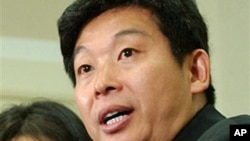An awards ceremony will be held in Norway next week for jailed Chinese dissident, Liu Xiaobo, the winner of this year's Nobel Peace Prize. Liu is a veteran of the 1989 Tiananmen Square pro-democracy protests in Beijing and one of China's most prominent rights activists. Our correspondent spoke recently to two other former Tiananmen Square demonstrators, who shared their thoughts about the peace prize and China's future.
In 1989, students calling for democracy in China met a violent end to their movement in Tiananmen Square in Beijing.
Zhang Boli was among those who escaped the crackdown and fled to the United States. He says he lost everything he had in China, but found faith in religion. He is now a Christian minister in the U.S. and says China has changed dramatically as a result of what happened at Tiananmen Square.
"So they started to develop the economy and gave people some more freedoms," said Zhang Boli. "For example, as long as you don't go against the government, you can have other freedoms."
Yang Jianli also took part in the Tiananmen Square student movement and is now continuing his pro-democracy work in the U.S. He says prosperity in China will ultimately effect change in political thought.
"When their life becomes more comfortable, they have more wealth, they will demand more say in the political process," said Yang Jianli.
But Yang says political change will be subtle, rising from the grassroots and not immediately from the government. He was not surprised when the government condemned Liu Xiaobo winning the Nobel Peace Prize.
"Liu Xiaobo was sentenced to jail because he violated Chinese law. His actions are diametrically opposed to the aims of the Nobel Prize," said an official Chinese television presenter. "The awarding of the peace prize by the committee to this person completely contradicts its aims and is an obscenity against the peace prize."
"On the surface, Chinese government, of course, continue control and after the announcement they tighten up the control even more, but that's the surface," said Jianli. "We tend to overlook the undercurrent in the society."
Just days after the Nobel committee made its announcement, retired communist party officials called on the government to allow more free speech in China.
"I think these two events, the Liu Xiaobo winning the prize and the retired party officials demanding more freedom of speech may not be the turning point, but I will say one of the tipping points in the whole process," explained Yang Jianli.
Some Chinese Dissidents See Subtle Changes Towards More Freedoms




